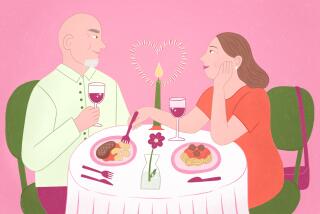Hey, Loser, Got a Message for You
- Share via
You’re standing by the pool at the hot rooftop bar at the Downtown LA Standard hotel, dressed in your lowest-riding jeans, brand-spanking new Manolos and the perfect Birkin bag. When here he comes.
Obnoxious. Too old. Too loud. Too short. Stuffed into cheap jeans that look like he bought them at a 99 Cents Only store. Mr. Needs-a-Breath-Mint wants your phone number.
Give him the digits, not the real ones, of course. Hand him this number--(310) 217-7638--and let the rejection hotline handle it.
He’ll get the message when instead of hearing your voice he listens to this message: “The person who gave you this number obviously did not want you to have their real number.”
There’s more.
“Maybe you’re just not this person’s type.... This could mean short, fat, ugly, dumb, annoying, arrogant or just a general loser. Maybe you suffer from bad breath, body odor or even both. Maybe you just give off that creepy, overbearing, psycho-stalker vibe. Maybe the idea of going out with you just seems as appealing as playing leapfrog with unicorns.”
The voice belongs to Jeff Goldblatt, a Web consultant and graduate student working on an MBA at Emory University in Atlanta. He’s 25, single and swears he’s never needed anything like the rejection hotline because he can see the signs and “know when someone’s not interested.” He answers the rejection hotline (via recorded message) in 14 U.S. cities--Los Angeles, Atlanta, Chicago, San Francisco, Washington, Denver, Seattle, Cleveland, Boston, Charlotte, Las Vegas, Miami, New Orleans, Indianapolis--and as of the first of this month, Dublin, Ireland.
Each city averages 50,000 phone calls per month, sometimes at a pace fast enough to crash the hotline. Boston and Charlotte went down in August overloaded by calls from guys getting the brushoff and others who heard about the message and couldn’t resist calling.
It started out as a joke last summer after Goldblatt and a group of friends watched “an old, fat, bald guy walking up to a young, attractive blond girl,” he said in a telephone interview from Atlanta. “We kind of looked at each other and said, ‘This can’t be good.’ We watched her shoot him down in a blunt, rude way. She sent him back to his friends with his pride in his hands. That started a discussion about whether it’s better to give out a fake phone number because it delays the rejection or does a fake phone number give people hope because they thought they got a digit wrong.”
He set up a residential voicemail account that cost $10 a month. He told a few friends, who told a few friends, who e-mailed a few friends, who overwhelmed the line.
He increased the capacity of the service and started expanding to new cities in May. The service arrived in L.A. in June.
To get the money he needs to upgrade the system, Goldblatt is in discussions with potential corporate sponsors. He identifies them as a couple of alcoholic beverage companies and a national magazine. The Los Angeles line is sponsored in part by LASinglesClub.com.
Goldblatt doesn’t want anyone to take his rejection hotline too seriously, although he believes the number provides a service. “The rejecter can get someone off their back who is not taking a hint.” The rejectee can save face as he listens in the privacy of his home to this: “Accept the fact that you’re rejected. Get over it. And, please do your best to forget about the person who gave you this number because trust us, they’ve already forgotten about you.”


